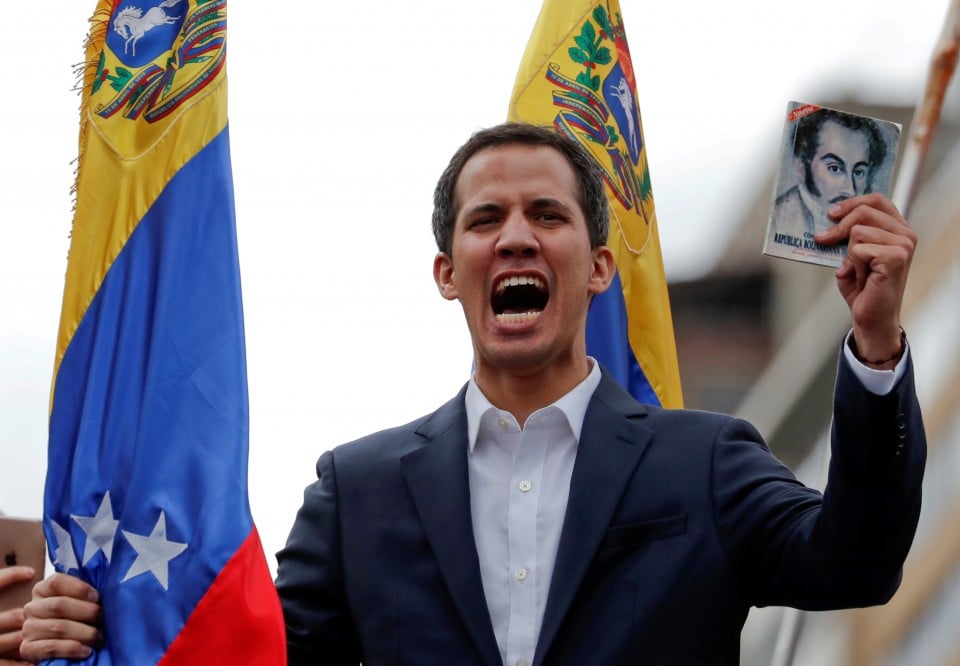Lilian Tintori is a human rights activist and wife of the imprisoned Venezuelan opposition leader Leopoldo López, a mentor to Juan Guaidó.
CARACAS, Venezuela — On Wednesday, I joined my Venezuelan brothers and sisters in the streets to rally against the dictatorial rule of Nicolás Maduro. These were not our first protests. As his self-inflicted humanitarian crisis has ravaged our country, our growing hunger has driven us to the streets countless times.
But this time, pain and suffering were absent from our faces. Instead, we felt joy, hope and excitement. For the first time, I saw Venezuelans from all walks of life and ideologies unite behind a shared vision for our future. Setting aside our differences, we came together in support of one man in whom we have invested our hopes for the future — the man we are excited to call our interim president, Juan Guaidó.
On Jan. 5 this year, when Guaidó became president of the National Assembly — Venezuela’s last remaining democratic institution — he pledged to defend the rule of law and restore constitutional order in our country. This was no small promise. Under Maduro, Venezuela’s democracy has been crushed. Maduro has stripped the opposition-led National Assembly of power and thwarted all our efforts to restore democracy by constitutional means, including a recall referendum. Last May, Maduro was “reelected” for a second term through a sham election, which more than 50 countries have refused to recognize due to a lack of fairness and transparency. When the National Assembly condemned the stolen election and refused to swear him in, Maduro turned to the loyalist-backed Supreme Court to administer the oath of office.
True to his promise, Guaidó has challenged Maduro’s usurpation of power by turning to our constitution. He invoked Article 233, which allows the president of the National Assembly to temporarily assume the presidency of Venezuela in the absence of a legitimately elected president. He also invoked Articles 333 and 350, which call on Venezuelans to defend the constitution and reject any regime that undermines democracy or human rights.
In the coming weeks, I am confident Guaidó, the National Assembly and the rest of us in the streets will finally achieve a democratic transition. Not only do we have the constitution on our side, but popular support as well. Almost 80 percent of the population thinks Maduro is a bad leader, including increasing numbers of traditionally pro-government sectors such as the military.
We know that, just like the rest of Venezuelans, the members of the military are also suffering from hunger, disease and scarcities. High-ranking military leaders may be more reluctant to cede power, but we continue to engage with them, offering amnesty to those who abandon Maduro and have not committed human rights violations and are willing to support democracy. Already, groups of soldiers have stepped up to denounce the regime’s terrible repression. We are counting on more members of the military to honor their duty to protect their people.
Soon, other concrete steps will be taken to ensure a peaceful transition. Guaidó will call for free and fair elections, as required by the constitution. The National Assembly will set up a transitional government focused on providing humanitarian aid to our people. And from the streets, we will continue to protest Maduro’s usurpation. In 2014, just before he was imprisoned by the regime, my husband, opposition leader and prisoner of conscience Leopoldo López, urged protestors to use non-violent protests to provide a path for a better future for our country. His words are as relevant today as ever — ultimately, it will be pressure from the streets that forces Maduro out of power.
But we will not succeed on our own. We need the international community to fully support Guaidó and our democratic cause. Most importantly, our allies need to recognize that our plan is the only viable one. If we fail, our population will be decimated by hunger and despotism. To avoid this, there are three steps the international community should take to help us achieve a smooth transition.
First, all democratic countries and multilateral institutions should immediately recognize Guaidó’s mandate. Already, more than 10 countries in the Americas, including the United States and Canada, as well as European allies, such as the United Kingdom, have recognized Guaidó as interim president. Germany, France and Spain will likely follow suit. Importantly, such countries should also suspend diplomatic ties with the Maduro regime and engage only with our transitional government.
Second, the international community should help us end our humanitarian crisis. While we are eternally grateful to our allies for the aid they have already pledged, what we need now is for the international community to help us get this aid to our people, who are starving. Our allies should send boatloads and truckloads of food and medicine to our borders, and if the regime denies this aid, they should significantly expand the consequences against those responsible.
Third, we need the international community to support our democratic transition every step of the way. To start, our allies could help us bring human rights abusers within the regime to justice by joining the multinational initiative to refer the regime to the International Criminal Court for committing crimes against humanity. Our allies can also provide technical support as we hold new elections and configure our new government.
Our fight for freedom is an uphill battle but we will not give up. Love of freedom runs deep in Venezuelans’ veins, and we know it is our duty to save our country. Earlier this month, Juan Guaidó reminded us of this responsibility when he quoted Rómulo Betancourt, the father of Venezuelan democracy: “When Venezuela needed liberators, it did not import them, it gave birth to them.”
We are the guardians of democracy that we have been waiting for. The Maduro regime’s time is up.
This was produced by The WorldPost, a partnership of the Berggruen Institute and The Washington Post.





